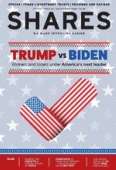Archived article
Please note that tax, investment, pension and ISA rules can change and the information and any views contained in this article may now be inaccurate.
UK in flux as state support sees borrowing spike and Brexit remains uncertain

A significant extension of the financial support available for individuals and businesses affected by coronavirus restrictions is unlikely to shift investor sentiment dramatically towards the hospitality and travel businesses at the sharp end of the pandemic.
The spending associated with this new commitment from chancellor Rishi Sunak comes against the backdrop of record levels of public borrowing.
Government debt is up £174.5 billion year-on-year in the six months to 30 September and at 103.5% of annual national income this translates the highest debt-to-GDP ratio since 1960.
This and the latest wrangling over Brexit, with a deal still some distance away despite the looming end of the transition period on 1 January 2021, could put pressure on sterling versus other major currencies.
Somewhat counter-intuitively the strain on government finances and the risks associated with failing to secure a Brexit deal could provide a short-term catalyst for the FTSE 100 given a weaker pound boosts the relative value of the overseas earnings which dominate the index.
It would likely be less positive news for the more domestic-facing FTSE 250 and longer term it could see overseas investors continue to give UK stocks a swerve, contributing to their depressed valuation compared with international counterparts.
OPTIMISM OVER A DEAL
Earlier this month, Shore Capital’s senior political adviser Matthew Elliot – the former head of the official Leave campaign from the 2016 referendum – speculated that: ‘Trying to decipher smoke signals in a hurricane is difficult, but I’m optimistic there will be a UK-EU trade deal by the end of the year.’
Elliott added that the ‘the political fallout is likely to be bigger than the economic one’ in the event a deal is not secured with the stance taken by current favourite for the US presidency Joe Biden expected to ‘play heavily into the situation’.
This may be why Boris Johnson is reportedly hedging his bets on Brexit until the result of the election is known.
One area of the economy where a no deal outcome could have a significant impact, in the short term at least, is groceries.
Under this scenario an average import tax of 18% will be charged on meat, produce and beverages coming from the EU into the UK from 1 January onwards.
Supermarkets may face a choice of taking a hit to margins or passing on these additional costs to hard-pressed consumers and Tesco (TSCO) chairman John Allan recently told Bloomberg shoppers might have to get used to doing without certain items for a few weeks or months.
Important information:
These articles are provided by Shares magazine which is published by AJ Bell Media, a part of AJ Bell. Shares is not written by AJ Bell.
Shares is provided for your general information and use and is not a personal recommendation to invest. It is not intended to be relied upon by you in making or not making any investment decisions. The investments referred to in these articles will not be suitable for all investors. If in doubt please seek appropriate independent financial advice.
Investors acting on the information in these articles do so at their own risk and AJ Bell Media and its staff do not accept liability for losses suffered by investors as a result of their investment decisions.
Issue contents
Cover Story
Editor's View
Feature
First-time Investor
Great Ideas
Money Matters
News
- UK in flux as state support sees borrowing spike and Brexit remains uncertain
- German software giant SAP pulls forward cloud plans
- Schroder British Opportunities on track despite other failed IPOs
- Bank stocks rally but dividend resumption hopes may be overdone
- Why stocks have fallen despite beating earnings

 magazine
magazine








